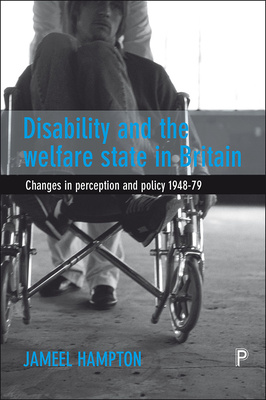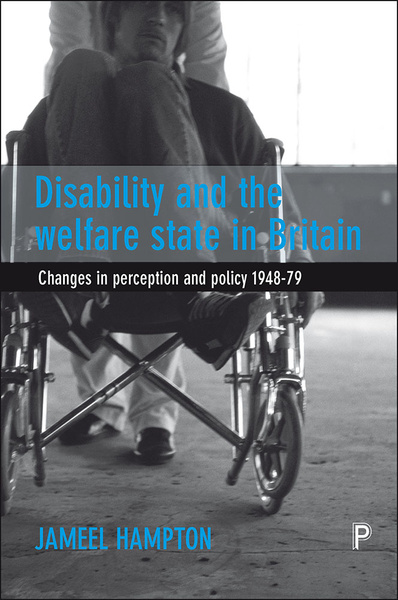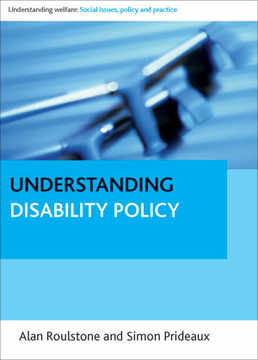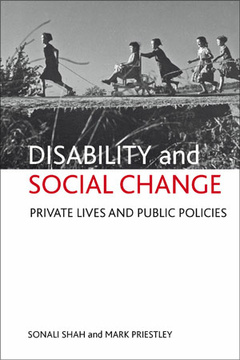Disability and the Welfare State in Britain
Changes in Perception and Policy 1948–79
By Jameel Hampton
Published
May 17, 2016Page count
288 pagesISBN
978-1447316428Dimensions
234 x 156 mmImprint
Policy PressPublished
Jul 1, 2016Page count
288 pagesISBN
978-1447335115Dimensions
Imprint
Policy PressPublished
Jul 1, 2016Page count
288 pagesISBN
978-1447335122Dimensions
Imprint
Policy PressCreated during and after the Second World War, the British Welfare State seemed to promise welfare for all, but, in its original form, excluded millions of disabled people. This book examines attempts in the subsequent three decades to reverse this exclusion. It is the first to contextualise disability historically in the welfare state and under each government of the period. It looks at how disability policy and perceptions were slow to change as a welfare issue, which is very timely in today’s climate of austerity. It also provides the first major analysis of the Disablement Income Group, one of the most powerful pressure groups in the period and the 1972 Thalidomide campaign and its effect on the Heath government. Given the recent emergence of the history of disability in Britain as a major area of research, the book will be ideal for academics, students and activists seeking a better understanding of the topic.
"Hampton’s monograph is important because it is the first to comprehensively synthesize the policy material on post-war disability. It will be essential reading for those in the growing field of disability history, providing much-needed and accessible context for the actions of central government." Twentieth Century British History
"I hope and expect that this interesting contribution from Jameel Hampton...will reach the wide and diverse audience it deserves and also stimulate much-needed further research." - H-Disability
"From 1948 to 1979, British society might have been on a 'collective train' into an egalitarian social democratic future, but, as Jameel Hampton argues, many disabled people were often left behind at the station...[this book] will interest humanities scholars of health and illness, medicine, and social policy. It contributes to emancipatory disability studies and will be of interest to those who work in personal social services today. This includes policymakers, who might read and reflect on how perception shaped reality for many disabled Britons since mid-century." British Medical Journal, Medical Humanities Blog
"For the first time Hampton shows how disabled people, neglected by the post-war welfare state, changed things from the 1960s by campaigning, like other excluded groups, achieving inclusive reforms in the 1970s." Patricia Thane, Kings College London
"Thoroughly researched and cogently argued, Disability and the Welfare State in Britain is a remarkable achievement. Hampton’s excavation and elucidation of archival material related to the Disability Income Group, as well as other key players in the debates over disability and statutory welfare in Britain in the twentieth century, is both important and impressive. Yet, readers with little experience in disability history, the history of twentieth-century Britain, or the modern welfare state, may find Hampton’s attention to detail daunting. Each chapter is so rich with information that one might find it most advantageous to attack the book one chapter at a time, formulating questions and critiques as one moves through this incredibly stimulating text. Given the seeming comprehensiveness with which Hampton articulates welfare debates within their specific contexts throughout the twentieth century, one can safely assume that Disability and the Welfare State in Britain will no doubt serve as an important benchmark for years to come." Michael Rembis, University of Buffalo, This Year's Work in Critical and Cultural Theory, Oxford University Press
"'Disability and the Welfare State in Britain' is history at its best in that it implicitly challenges unchecked assumptions held in the present and encourages readers to locate disability exclusion and resistance in a longer and much more multi-faceted story." Robert McRuer, George Washington University, Cercles: revue pluridisciplinaire du monde anglophone
Jameel Hampton is a lecturer at Liverpool Hope University. He was an Andrew W. Mellon Postdoctoral Fellow at the Society, Work and Development Institute of the University of the Witwatersrand, South Africa. He has lectured in history at the University of Regina, Saskatchewan, Canada.
Foreword by Nicholas Timmins;
Introduction;
The Old Regime: Provision before the Welfare State;
Promotional Welfare, 1948-63;
The Emergence of the General Classes, 1964-9;
Cinderella of the Welfare State: Legislation for the General Classes, 1970-2;
The Final Days: Disability at the End of the Welfare State, 1973-9;
The Last Waltz: Epilogue;
Summary and Conclusions, 1948-79.













